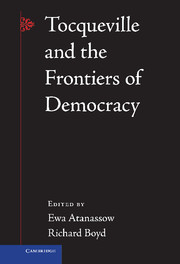Book contents
- Frontmatter
- Contents
- List of Contributors
- Short Title Abbreviations of Tocqueville's Major Works
- Acknowledgments
- Introduction: Tocqueville and the Frontiers of Democracy
- Part One The Meaning of Democracy and the Democratic Revolution
- Part Two Democratization in a Non-Western Context
- Part Three Challenges of Globalization: Democracy, Markets, and Nationhood
- Part Four Democracy, Imperialism, and Foreign Policy
- Part Five Democracy's Old and New Frontiers
- 13 Tocqueville, the Problem of Equality, and John Ford's Stagecoach
- 14 The Poetry of Democracy
- 15 Tocqueville and the Local Frontiers of Democracy
- Epilogue: New Frontiers, Old Dilemmas
- Bibliography of Works Cited
- Index
14 - The Poetry of Democracy
Published online by Cambridge University Press: 05 April 2013
- Frontmatter
- Contents
- List of Contributors
- Short Title Abbreviations of Tocqueville's Major Works
- Acknowledgments
- Introduction: Tocqueville and the Frontiers of Democracy
- Part One The Meaning of Democracy and the Democratic Revolution
- Part Two Democratization in a Non-Western Context
- Part Three Challenges of Globalization: Democracy, Markets, and Nationhood
- Part Four Democracy, Imperialism, and Foreign Policy
- Part Five Democracy's Old and New Frontiers
- 13 Tocqueville, the Problem of Equality, and John Ford's Stagecoach
- 14 The Poetry of Democracy
- 15 Tocqueville and the Local Frontiers of Democracy
- Epilogue: New Frontiers, Old Dilemmas
- Bibliography of Works Cited
- Index
Summary
In 2008, the editors of Dissent magazine invited a number of writers to comment on the jury system, which the editors regarded as, in their phrase, “probably the original form of participatory democracy.” Dissent is a New York magazine with solid liberal and socialist roots reaching back to the 1950s and memories reaching back even earlier into the mists of the workers’ movement of the nineteenth century. From the viewpoint of a magazine with roots and archaic memories of that sort, participatory democracy seemed distinctly an ideal – maybe the magazine's loftiest ideal of all, the name of its desire. The Dissent editors of 2008 fretted about their ideal, however. They wanted to know how participatory democracy has fared in the United States of our own time. They had their worries. And they came up with a clever way of conducting an inquiry.
They turned to Alexis de Tocqueville and his account of the jury system in Democracy in America. Tocqueville's discussion appears in the little section called “The Jury in the United States Considered as a Political Institution,” which concludes chapter VIII of Democracy in America's Volume One, Part Two. The editors quoted the opening sentence, from a 1966 translation by George Lawrence: “My subject having led me to discuss the administration of justice in the United States, I shall not leave it without speaking of the jury.” Tocqueville composed his sentence in a pointedly offhand style, as if the jury system were merely something to mention in afterthought – an idiosyncrasy of American life that, like fast food and tobacco chewing, European travelers might feel obliged to mention but not something to dwell upon. Tocqueville was sly, though, and juries were not, for him, an afterthought.
- Type
- Chapter
- Information
- Tocqueville and the Frontiers of Democracy , pp. 307 - 316Publisher: Cambridge University PressPrint publication year: 2013



